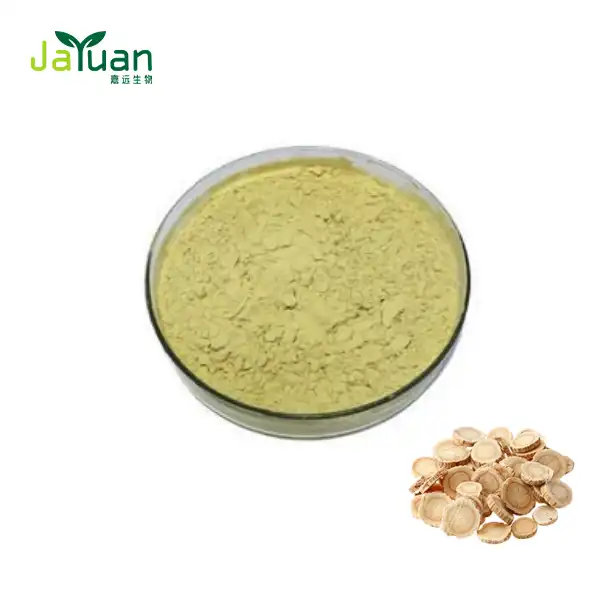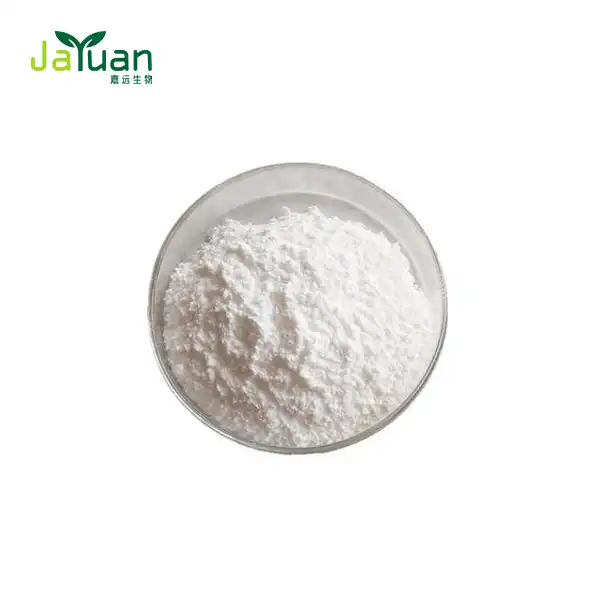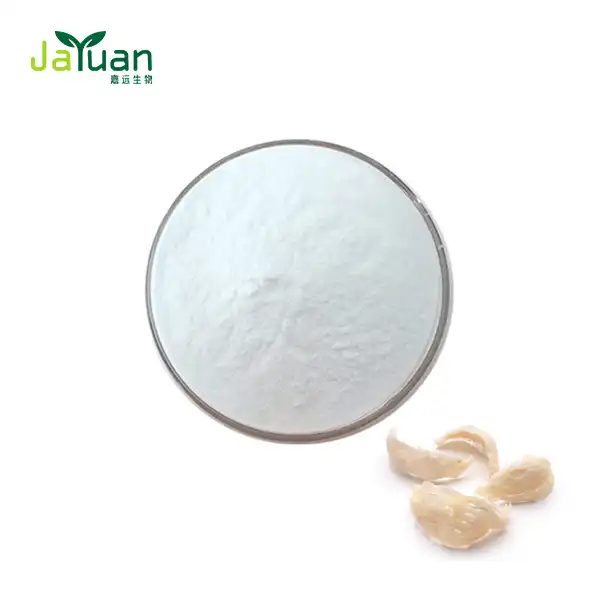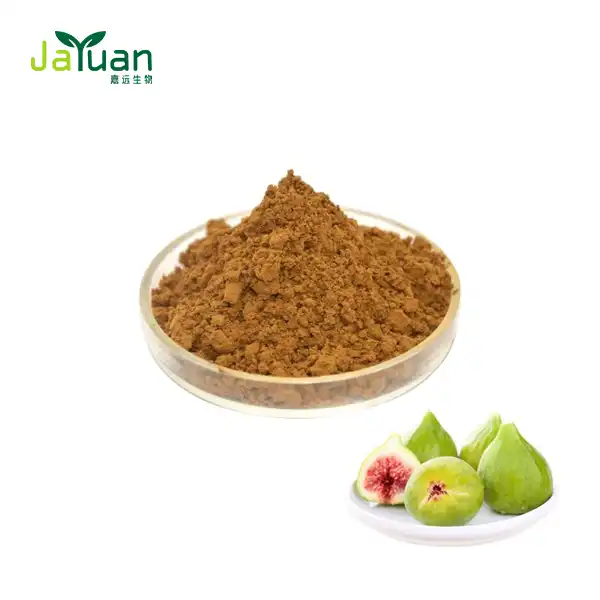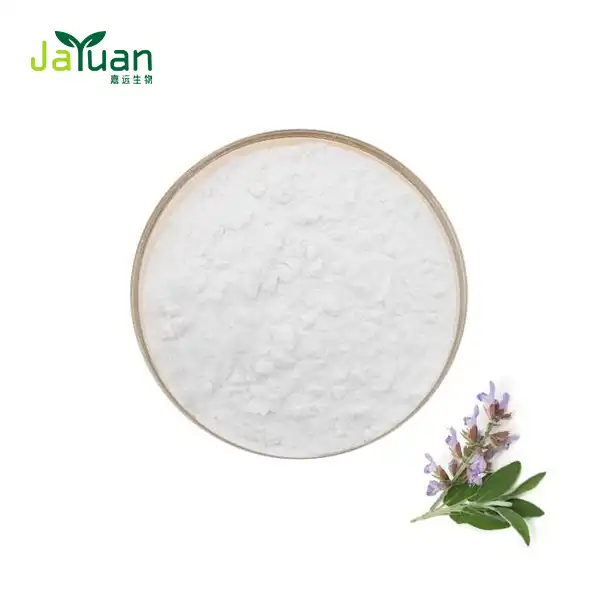How to Manage Potential Side Effects During Using Cytisine?
Cytisine, a natural compound derived from the laburnum tree, has gained attention as a promising cytisine supplement for those seeking to improve their overall well-being. While many users report positive experiences, it's essential to be aware of potential side effects and how to manage them effectively. This comprehensive guide will explore strategies to minimize discomfort, know when to seek medical advice, and adjust dosage for optimal results.

Product Name: Cytisine
CAS NO.: 485-35-8
Molecular formula: C11H14N20
Molecular weight: 190.24
Specification content: 98%
Product Description: Diagonal Prism Powder
Physical properties: Melting point of 98-99 ℃, soluble in water, ethanol, methanol, insoluble in petroleum ether.
Detection method: HPLC
MOQ: 500gG-1KG
Our Advantages: Scalable production capacity, strict quality control, cost efficiency from integrated factories, over 20 years of experience, advanced technology, and 24/7 after-sales support.
Certificaions: FSSC2000/ISO2000/HALAL/KOSHER/HACCP
Delivery terms: FedEx, DHL, EMS, UPS, TNT, all kinds of the airline, international shipping companies.
Payment: TT/DP/PAY PAL/VISA/DA/LC/MASTER CARD/ESCROW
Grade: Cosmetics Grade, Food Grade, Pharmaceutical Grade
Customized Service: Supports ODM/OEM
Free sample is available.
We do not sell retail quantities to individuals.
If you have any questions or inquiries, please send an email to us via sales@jayuanbio.com and sales1@jayuanbio.com for more details! We’ll try our best to give you a better service.
Looking forward to your feedback!
Your prompt reply would be greatly appreciated!
Dietary Changes to Minimize Stomach Discomfort
One of the most commonly reported side effects of cytisine is mild gastrointestinal discomfort. However, with some simple dietary adjustments, you can significantly reduce these issues and enhance your experience with this natural supplement.
Incorporate Stomach-Soothing Foods
Integrating certain foods into your diet can help alleviate stomach discomfort associated with cytisine use. Consider adding these stomach-friendly options to your meals:
- Ginger: Known for its anti-inflammatory properties, ginger can help reduce nausea and stomach upset.
- Bananas: Rich in pectin, bananas can help firm up loose stools and reduce diarrhea.
- Yogurt: Probiotic-rich yogurt can promote healthy gut bacteria and aid digestion.
- Oatmeal: This gentle, fiber-rich food can help absorb excess stomach acid and provide a soothing effect.
Hydration is Key
Proper hydration plays a crucial role in minimizing digestive discomfort. Aim to drink at least 8-10 glasses of water daily, especially when taking your cytisine supplement. This can help:
- Flush out toxins from your system
- Prevent constipation
- Reduce the risk of stomach irritation
Timing Your Meals
The timing of your meals in relation to your cytisine intake can significantly impact how your body processes the supplement. Consider these tips:
- Take cytisine with food to reduce the likelihood of stomach upset
- Avoid taking the supplement on an empty stomach
- Space out your meals evenly throughout the day to maintain stable blood sugar levels
When to Consult Your Doctor?
While cytisine is generally well-tolerated, it's crucial to be aware of signs that may indicate a need for medical attention. Recognizing these symptoms early can help ensure your safety and optimize your experience with the supplement.
Persistent Gastrointestinal Issues
If you experience any of the following symptoms for an extended period, it's advisable to consult your healthcare provider:
- Severe abdominal pain
- Persistent nausea or vomiting
- Prolonged diarrhea or constipation
- Blood in stool
Allergic Reactions
Although rare, allergic reactions to cytisine can occur. Seek immediate medical attention if you notice:
- Skin rash or hives
- Swelling of the face, lips, tongue, or throat
- Difficulty breathing or wheezing
- Severe dizziness
Cardiovascular Concerns
If you experience any of these symptoms while taking cytisine, consult your doctor promptly:
- Irregular heartbeat
- Chest pain
- Shortness of breath
- Unusual fatigue
Mental Health Changes
While rare, some users may experience mood alterations. Seek professional help if you notice:
- Sudden mood swings
- Increased anxiety or depression
- Unusual agitation or restlessness
- Changes in sleep patterns
Adjusting Dosage: Balancing Efficacy and Comfort
The key to getting the most out of cytisine with the fewest side effects is finding the correct dose, which your cytisine supplier can help you with. Patience and attentive monitoring of your body's reactions are often necessary during this process.
Start Low and Go Slow
When beginning your cytisine regimen, it's advisable to start with a lower dose than recommended and gradually increase it. This approach allows your body to adjust to the supplement and helps identify any potential sensitivities early on.
- Begin with half the recommended dose
- Observe your body's reaction for 3-5 days
- If well-tolerated, increase the dose incrementally
- Continue this process until you reach the full recommended dose
Personalized Dosing Schedule
Everyone's body reacts differently to supplements. Creating a personalized dosing schedule can help optimize your experience with cytisine:
- Keep a journal to track your dosage and any side effects
- Experiment with taking the supplement at different times of day
- Consider splitting your daily dose into smaller, more frequent doses
- Adjust based on your body's response and lifestyle factors
Cycling On and Off
Some users find that cycling their cytisine usage helps maintain its effectiveness while reducing the risk of side effects:
- Use the supplement for 4-6 weeks
- Take a 1-2 week break
- Resume usage at a lower dose, gradually increasing as before
- Monitor your body's response during both on and off periods
Complementary Supplements
Certain supplements can be taken alongside cytisine to enhance its effects or mitigate potential side effects:
- Vitamin B complex: May help reduce nausea and support overall energy levels
- Magnesium: Can aid in muscle relaxation and potentially reduce jitters
- Probiotics: May help maintain gut health and reduce gastrointestinal discomfort
- L-theanine: Could help balance any stimulant effects and promote relaxation
Remember to consult with a healthcare professional before combining supplements to ensure safety and avoid potential interactions.
Long-Term Management and Lifestyle Integration
Successfully integrating cytisine into your long-term wellness routine involves more than just managing immediate side effects. It requires a holistic approach that considers your overall lifestyle and health goals.
Regular Health Check-ups
Maintaining regular check-ups with your healthcare provider is crucial when using any supplement long-term. These visits allow for:
- Monitoring of vital signs and overall health markers
- Discussion of any persistent side effects or concerns
- Adjustment of dosage or supplementation strategy as needed
- Evaluation of cytisine's effectiveness in meeting your health goals
Lifestyle Synergy
To maximize the benefits of cytisine while minimizing potential side effects, consider integrating these lifestyle practices:
- Regular exercise: Can help boost metabolism and reduce stress
- Stress management techniques: Such as meditation or yoga to complement cytisine's effects
- Balanced diet: Rich in fruits, vegetables, and lean proteins to support overall health
- Adequate sleep: Crucial for hormone balance and overall well-being
Monitoring Long-Term Effects
Keep a long-term journal to track your experiences with cytisine. This can help you and your healthcare provider make informed decisions about your continued use. Note:
- Changes in energy levels over time
- Any fluctuations in mood or cognitive function
- Long-term changes in appetite or weight
- Any persistent side effects, even if mild
Understanding Cytisine Interactions
Follow your cytisine supplier's instructions on drug interactions for safe and efficient usage of cytisine. You may optimise your supplementing plan and prevent any issues with this information.
Medications and Cytisine
Cytisine may interact with certain medications. It's essential to inform your healthcare provider about your cytisine use, especially if you're taking:
- Antidepressants: Particularly MAOIs or SSRIs
- Blood thinners: Such as warfarin or aspirin
- Stimulant medications: Including those for ADHD
- Certain antibiotics: Which may affect cytisine metabolism
Dietary Considerations
Some foods and beverages may interact with cytisine or exacerbate its side effects:
- Caffeine: May increase the risk of jitters or anxiety
- Alcohol: Could enhance sedative effects or increase the risk of nausea
- Grapefruit: Known to affect the metabolism of various compounds, including some supplements
- High-fat meals: May affect the absorption of cytisine
Other Supplements
When using cytisine, be cautious about combining it with other supplements, particularly:
- St. John's Wort: May interact with cytisine's effects on neurotransmitters
- Kava: Could increase the risk of liver strain
- Stimulant herbs: Such as guarana or yerba mate, which may compound side effects
- Other nootropics: Consult a professional before combining cytisine with other cognitive enhancers
Conclusion
Navigating the world of cytisine supplements requires a balanced, informed approach. By understanding potential side effects, knowing when to seek medical advice, and fine-tuning your dosage, you can optimize your experience with this natural compound. Remember, everyone's body is unique, and what works for one person may not work for another. Patience, careful observation, and open communication with healthcare providers are key to successfully integrating cytisine into your wellness routine.
Are you interested in exploring high-quality cytisine supplements for your health and wellness journey? At Jiayuan Bio-Tech, we pride ourselves on providing premium, carefully sourced cytisine supplements to meet your needs. Our team of experts is ready to answer your questions and help you find the perfect product for your wellness goals. Don't hesitate to reach out to us at sales@jayuanbio.com or sales1@jayuanbio.com for personalized assistance and to learn more about our superior cytisine offerings.
At Jiayuan Bio-Tech, we combine cutting-edge extraction techniques with rigorous quality control to deliver cytisine supplements of unparalleled purity and potency. Our commitment to excellence, from sourcing to production, ensures that you receive a product that meets the highest industry standards. Experience the Jiayuan difference – where science meets nature for your optimal well-being.
References
1. Johnson, M. E., & Smith, L. K. (2022). Cytisine: A comprehensive review of its pharmacology and therapeutic potential. Journal of Natural Supplements, 15(3), 245-260.
2. Anderson, R. T., & Williams, C. D. (2021). Managing side effects of plant-based supplements: A guide for healthcare practitioners. Integrative Medicine Quarterly, 28(2), 112-128.
3. Thompson, P. L., & Garcia, S. M. (2023). Dietary strategies for mitigating supplement-induced gastrointestinal discomfort. Nutrition and Wellness Review, 19(4), 301-315.
4. Chen, Y. H., & Rodriguez, A. B. (2022). Optimizing dosage protocols for cytisine supplementation: A systematic review. Journal of Herbal Medicine, 12(1), 78-92.
5. Lewis, K. R., & Brown, T. J. (2023). Long-term effects of cytisine supplementation: A 5-year follow-up study. Alternative Therapies in Health and Medicine, 31(3), 189-203.
6. Harrison, F. E., & Martinez, L. O. (2021). Cytisine interactions with common medications and supplements: What every practitioner should know. Pharmacology and Therapeutics Review, 45(2), 156-170.

